AI social media analytics is an enhanced tool that provides businesses with more granular and actionable insights for data-backed decisions. And provides invaluable help for companies looking to understand better their audience, the new trends and their social media overall performance.
Let’s look at what AI social media analytics entails and explore how new AI technologies can be applied to deliver valuable information for effective decision-making in business.
Social Media Analytics Definition
Social media analytics is the process of gathering and analysing data from social media networks to improve the business decision process.
AI social media analytics means employing machine learning techniques and smart algorithms to collect, process and extract noteworthy insights from a vast amount of social media data.
AI-powered technology identifies patterns in social discussions, deciphers sentiments and makes predictions based on existing data sets.
And is able to comprehend human behaviour in depth and on a large scale. Thus, empowering marketers and business leaders to make data-backed decisions in real-time.
Such solutions enable companies to conceive strategies that resonate with their audience at deeper levels in a dynamic social media realm.
Social media analytics is an ongoing process. Online data is forever generated and in flux, so businesses of all sizes should regularly conduct assessments to keep up to date with what consumers say.
AI-Driven Insights Advantages
AI social media analytics’s major benefit is its ability to convert raw data into meaningful and actionable strategies.
For businesses, it translates into real-time access to precise and comprehensive information regarding their customers’ sentiments, behaviours and preferences. It’s more than knowing what’s happening now. It’s comprehending the why behind the events and predicting the future ones.
Based on these AI-generated insights, companies can refine their message better, tailor marketing campaigns, and capitalise on early opportunities when they arise.
Key Features of Social Media Analytics AI Tools
Measure the success of a social media campaign
AI social media analytics allows you to assess the effectiveness and value of your marketing campaigns at a more granular level.
Discover which messaging and content best resonates with your audience and why in real-time. With the right tools, engagement and sentiment data are easy and quick to gather and use as KPIs for marketing analysis.
Identify your audience’s pain points
Online customer review sites are rich in valuable information about your existing customers’ experiences with your brand, product, or service. Discover regularly occurring customer pain points and leverage that information across your business.
For example, if customers perceive that your product lacks a specific feature or function, that’s highly useful information for your product development team.
Your customer service team can also use customer pain point information to structure a cohesive response for regularly occurring issues.
Brand sentiment
Social media analysis is a solid way to measure the health and reputation of your company. At a time when most people read consumer reviews before making a purchase, positive brand sentiment on social media is critical to brand health.
Regular social media analysis lets you spot a PR crisis in its early stages and formulate a response before it’s too late.
Competitor analysis
Analysing social media data has a great benefit: it’s easy to get a large amount of publicly accessible data from your competitors.
You can run a like-for-like analysis against other companies within your industry and get insights into your performance differences. Identify where your competitors excel and use that information as a benchmark.
Your marketing team can leverage this same information to pinpoint where you have the competitive advantage and centre your messaging around the distinguishing features of your product or service.
Consumer intelligence
Social media analytics AI can also help you identify different audience customer profiles. Beyond simple demographic information, you can discover the type of content your audience most connects with, their likes, values, preferences and even their personality traits with the right tools.
This can help you build better relationships with your existing consumers, improve customer service, and even boost sales by refining your messaging to attract the people most likely to buy your product or service.
Sentiment analysis
It’s a sort of mood detector for social media content. And employs advanced AI algorithms to identify and understand the emotions of users expressed in social posts, comments and other online conversations.
Sentiment analysis determines whether a message’s tone is negative, positive or neutral. Its mission is to study the subjective information available via text analysis, natural language processing (NLP) and computational linguistics.
Trend identification
It enables identifying emerging topics, conversations or hashtags before they become mainstream. And could be considered a sort of radar that spots what creates buzz on social media at a particular moment.
Trend identification is a tactic that makes predictions based on historical data sets. By comparing data points in time, it spots social media topics that are trending up, down or stagnating.
Predictive analytics
Predictive analytics is a cutting-edge type of analytics that combines artificial intelligence, machine learning and statistical models to forecast the future. It uses historical data and patterns to develop potential outcomes.
AI for Social Media Analytics
It’s notoriously difficult to accurately extract data from written text. The majority of social media data is unstructured. That is to say, it doesn’t fit neatly into an Excel sheet.
To add to the challenge of analysing social media data, human language is complex. There are many ways to express the same idea, and we can be nuanced and indirect – things that computers have a hard time decoding.
A particular branch of AI is needed, known as natural language processing (NLP), but not all NLP models are the same. Some require an intensive amount of training by a linguist; others require a large amount of data in order to be accurate.
All of this makes advanced social media analytics AI highly impractical at best and, in most cases, prohibitive in terms of time and cost.
Best AI Social Media Analytics Tools
Today, we have a large variety of AI social media analytics tools available, each offering a set of functionalities to depict the wealth of social media data. Among the most prominent, we count:
Symanto
Symanto is a next-generation AI software that develops a wealth of capabilities related to text analytics and social media text analytics. And has applicability in multiple areas.
At Symanto, we leverage text analytics to derive advanced user insights that go more in-depth than ratings and sentiment.
In a nutshell, we provide highly granular and accurate results, such as critical details that reveal the “why” behind the sentiment.
Low-training NLP technology
Symanto is at the forefront of NLP research and technologies. Our models require very little training. We’ve also developed several ready-to-go use case models for several industries: like Banking, Consumer Electronics, E-Commerce, Hospitality, Pharma and many more.
High level of accuracy on short excerpts of data
While some NLP AI requires a vast amount of text data to be accurate, our models are effective even on text excerpts as short as 10 words.
From topic and sentiment detection to psychographics (see below), with Symanto’s superior accuracy, you’ll get more precise, granular insights for better decision-making.
Use data from review sites, forums and more
Most social media listening tools are designed to work on traditional social media channels e.g Twitter, Instagram, YouTube etc., but not essential sources such as Google reviews, Amazon product reviews and other forums. The result is multiple information silos which are difficult to form into one cohesive database.
Symanto technology makes it easy to gather data from multiple sources, including those mentioned above, and get a cohesive, like-for-like analysis.
Psychographics
Regarding consumer intelligence, Symanto offers ground-breaking personality trait detection technology. It is based on the work of Carl Jung and aims to reveal more about the people behind the reviews.
For example, a text sample can reveal whether someone is more driven by rationality or emotions or has an emotional connection to your brand.
Leverage this information to hone your marketing and customer service communications, optimise engagement and boost sales.
Compare your customers’ psychographics to those of your main competitors to see if your business is already attracting a specific niche of consumers within your industry.
Using Symanto, you will enjoy significant benefits like
- Access and collecting data from multiple sources to uncover detailed consumer insights.
- Discover relevant user insights via psychology AI.
- Obtain accurate sentiment at the topic level and text level.
- Get advanced opinion analysis personalised for your audience.
- Tailor your dataset analysis model to adjust sentiment and topics as per your niche requirements.
Improve your decision-making process by extracting critical metrics in real-time from your text data.
Get Started with Symanto
Learn more about implementing Symanto AI technology for social media analytics. Get in touch or book your free personalised demonstration.
Case study
We used Symanto’s AI-powered technology to evaluate the impact of BMW’s ad for their electric model BMW iX during the Super Bowl 2022.
Acquiring 141 million viewers in 24 hours, the above-mentioned ad received excellent engagement on Twitter. Plus, the mentions of the BMW iX soared by 941% during the following week.
At first sight, considering just the engagement, the ad was a great success for BMW. But engagement is not everything. Symanto’s platform was used to measure how the ad campaign was received on social media channels and if they successfully impacted the discussions around electric vehicles.
Digging deeper into the data revealed that the ads were unsuccessful in answering commentators’ concerns regarding electric vehicles. Moreover, in the long term, the net sentiment was negatively impacted.
The BWM ads created a buzz around the subject for the moment, but they didn’t appear to increase the engagement of loyal customers. And the percentage of commentators labelled “at-risk” doubled.
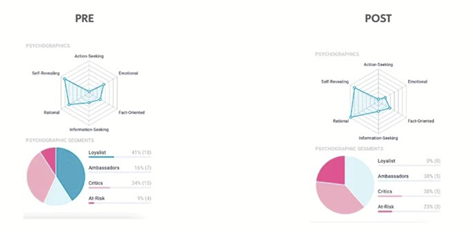
Pros and Cons
| Advantages | Disadvantages |
|---|---|
| Advanced valuable insights | Slight learning curve |
| Real-time data and insights delivery | Data overload |
| Psychographics | |
| Highly accurate results | |
| Low training NLP |
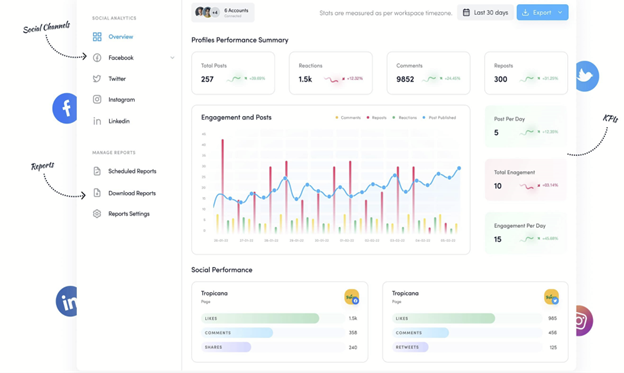
ContentStudio is a multifaceted, all-in-one social media solution dedicated to marketers, agencies and brands that are looking for an easy way to grow their social presence.
This is an award-winning and highly-rated platform that serves over 120,000 happy customers across the globe.
It includes an array of services for planning and creating content, an AI writer, features for analysing and reporting social media KPIs, finding and curating trending topics, etc.
Their social media analytics product aims to help customers monitor and analyse relevant metrics for their brand and fine-tune their social strategy. And includes the following features:
- Real-time analytics and reporting on social media performance from one dashboard.
- Advanced analytics to determine publishing schedule and report on engagement. Access statistics for each social channel showing audience evolution, its demographics and what type of content they engage with.
- Noteworthy insights are displayed in user-friendly automated reports.
- Competitive benchmarking. Compare your social media performance with your competition, identify new opportunities and improve your social strategy with insights from competitors.
Pros and Cons
| Advantages | Disadvantages |
|---|---|
| Real-time analytics | Learning curve |
| Advanced insights and analytics for each channel | Quite a complex interface |
| Competitor analysis | |
| Automated reports |
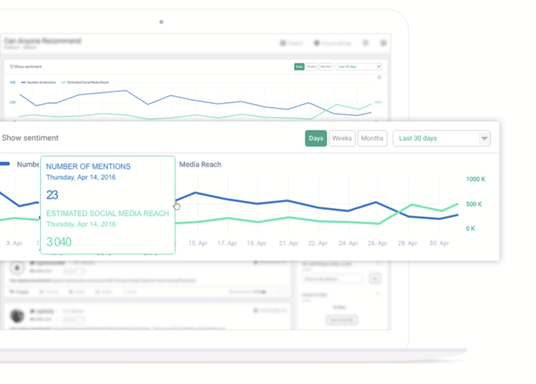
This is primarily a social listening tool with robust AI social media analytics characteristics. It monitors +25 million online sources in real-time, including social media, reviews, blogs, forums, videos, etc.
Brand24 enables companies to get AI-powered brand reports that include personalised suggestions and actionable insights to sustain growth and development.
It helps businesses surpass their competitors by identifying relevant events and early trends within online chatter. And make correlations to profit on emerging opportunities or assess potential challenges.
The most relevant features of social media analytics are:
- Leverage online conversations and get customer insights based on their feedback.
- Identify customers’ preferences and what they appreciate about your products/services.
- Make improved and data-backed decisions.
- Mention analytics to know your audience better.
- Influence score to help you make decisions based on data regarding the influencers you collaborate with.
- Sentiment analysis to identify positive, neutral and negative emotions, determine clients’ attitudes, and prevent potential issues.
Case study
Researchers from SWPS University use Brand24 features to spot trends and determine pivotal elements for scientific developments, market monitoring and trend analysis.
This platform is advantageous for research and development activity thanks to the variety of online sources accessed and the accuracy of the data collected. And for identifying the innovation potential in different areas.
The team uses features like Domain Filter to drive cognitive value in multiple verticals of science and economy. And sentiment filter, categorisation by domain to discover potential services that can be offered and stay ahead of the competition.
Pros and Cons
| Advantages | Disadvantages |
|---|---|
| User-friendly interface | Learning curve |
| Sentiment analysis | Updates in real-time not available for some of the plans |
| Competitor analysis | |
| Customisable reports |
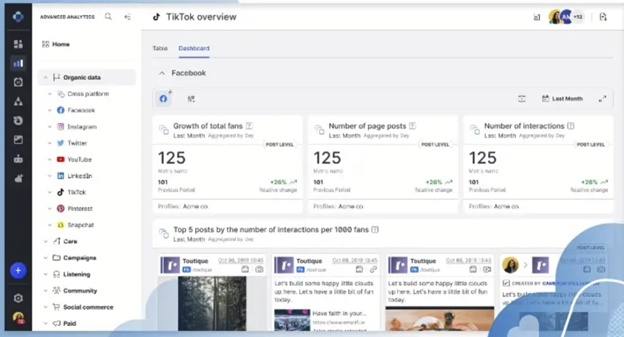
Improve the social journey with robust tools enhanced by AI powers. This software solution offers a large variety of capabilities like analytics, content creation, UGC, content publishing, community management, customer care and influencer marketing, among others.
Emplifi Social Marketing Cloud provides world-class analytics and insights features. Their platform helps customers unearth valuable insights that generate actual results for their companies.
Thanks to automation and AI, Emplifi converts unstructured social media data into actionable insights. Via a unified interface that gathers analytics and engagement measurement instruments.
You have the possibility to quickly analyse social campaigns in real-time, make comparisons and track KPIs.
The most relevant features for analytics offered are:
- Omnichannel insights. Know your social audience across channels, and comprehend customer interactions and relevant touchpoints.
- Competitive insights to stay ahead of the curve.
- Automated reports to minimise the time spent on reporting activities.
- Customisable analytics – define your KPIs and track them in real-time.
- Automate workflows and tagging tasks – create flexible text rules to categorise your content.
- Interactive data points – spot hidden details in your customised reports.
- Automated sentiment analysis – identify your customers’ perception angle and determine what resonates best with them and why.
Pros and Cons
| Advantages | Disadvantages |
|---|---|
| Powerful analytics and reporting | Report templates would need more options for customisation |
| Sentiment analysis | Lack of sharable web dashboards |
| Competitor analysis | Complex usage |
| Robust, actionable insights | High price |
| Centralised social media management |
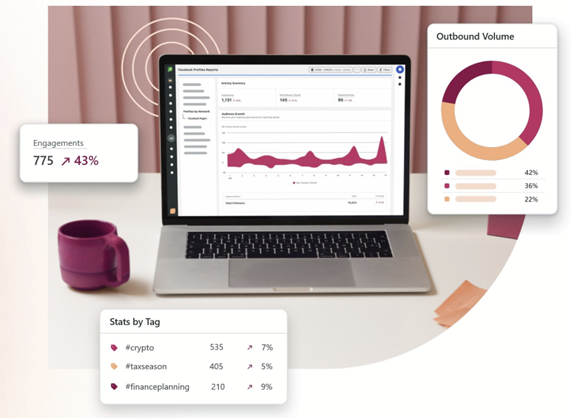
Use a performant platform to instantly measure your social media activity’s performance. With the help of comprehensive analytics tools that deliver advanced insights related to market trends and your audience’s preferences.
Sprout Social’s AI social media analytics characteristics allow your team to concentrate primarily on strategic thinking. By automating time-consuming manual tasks. And delivering AI-driven centralised insights.
Powerful analytics features are always backed by solid reporting capabilities. And Sprout delivers a variety of reports like profile performance, tag, post performance, competitor, tasks and network reports.
Moreover, their premium analytics tools allow multiple customisations like
- Selecting the most relevant metrics for your current social media goals and easily distributing the obtained insights to relevant team members.
- Personalise reports on your audience by displaying just the pertinent metrics for your decision-makers.
- Obtain insights promptly in the needed form by using advanced filters based on content, tag or type of message.
- Assess your business’s social performance with features like report builder, interactive charts, advanced filtering, custom metrics and comparisons.
Case study
Nutrisense is a health technology company that helps its customers build healthy habits by monitoring the factors influencing their metabolism, e.g. food and exercise.
They used the Social Sprout platform to expand their social media engagement by 45% and their community by 469%. Nutrisense obtained such results by leveraging insights and user-generated content.
Pros and Cons
| Advantages | Disadvantages |
|---|---|
| Powerful analytics and reporting | High price |
| Real-time, actionable insights | Limited features |
| User-friendly interface | Social media limitations |
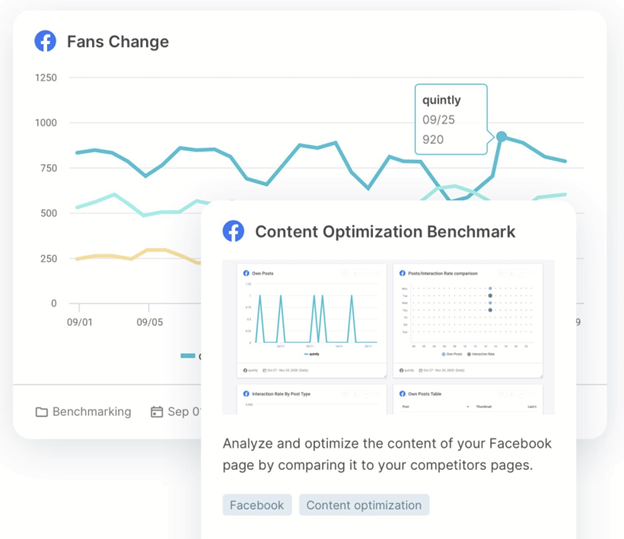
Quitly has a daring promise for their customers “Scale social media your way”. That is to be accomplished with high-level customisation, quality and flexibility.
Obtain insights to generate business results via social media faster. You have at your disposal hundreds of social media metrics and customisable dashboards to build reports and get relevant analyses.
Plan your marketing success based on data-backed decisions reinforced by analytics.
The prominent features that make Quintly the provider of choice for many brands are:
- Select from 350+ social media metrics to measure your social media success. Personalise the existing ones or build metrics from scratch.
- Get relevant insights from your social data instantly. No matter if you are interested in a particular data point or if you need to identify your metrics.
- Ready-made dashboards for social KPIs. Quintly created a library of pre-made dashboards for specific case studies that you can use to build your analytics dashboards in minutes.
- Competitive benchmarking. Always know what your competition is doing on social media, compare your channels with those of competitors and draw insights to lead your strategy.
Pros and Cons
| Advantages | Disadvantages |
|---|---|
| Powerful analytics and reporting | Onboarding is time-consuming |
| Reliable insights | Steep learning curve for beginners |
| Customisable dashboards | Somewhat expensive for businesses with limited budgets |
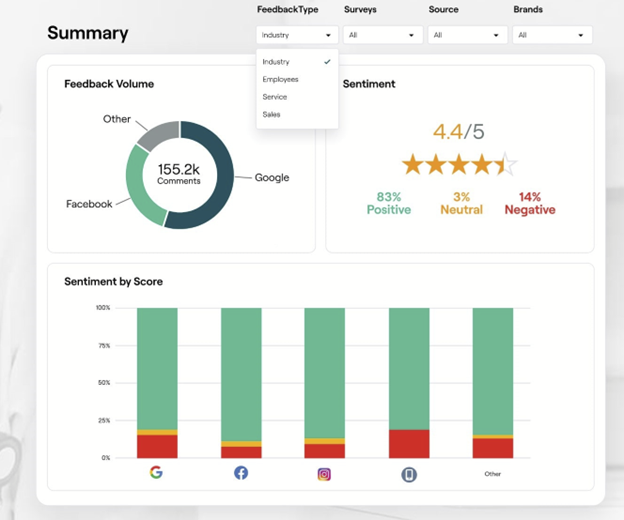
Reputation is a complex software solution that handles the entire spectrum of customer feedback, from purchases to loyal brand ambassadors.
Their platform includes multiple products like social suite, business listings, reviews booster, surveys, insights, competitive intelligence, location pages and more.
Among others, this AI social media analytics tool helps create efficiency. Their prescriptive AI delivers insights, analysis and competitive intelligence. Analyse all feedback in real-time and spot trends and critical actions.
Reputation’s customer insights tools are powered by NLP and dissect customer sentiment and feedback to surface hidden topics and insights. The most relevant characteristics of their platform related to analytics are
- Competitive reporting. Analyse the feedback received by your competitors, and check on their performance ratings and reputation scores. Identify your weaknesses and strengths in comparison with your competitors.
- Leverage insights. Gain a clear understanding of your brand’s perception and the “why” behind it.
- Advanced text analytics to comprehend details at scale. Identify clients’ pain points, and determine if your audience’s comments are positive or negative.
- Craft rich sentiment maps. Visualise sentiment and volume in appealing charts.
- Categorise feedback automatically. Group clients’ comments into relevant customisable categories for your industry.
Pros and Cons
| Advantages | Disadvantages |
|---|---|
| Strong analytics and reporting | At times the data accuracy is not at the expected level |
| Rich sentiment maps | Learning complexity |
| Advanced insights | At times the data is incomplete |
| Competitive reporting | Scoring issues |

